
|

Corporate Finance Review
About the Publication:
Monthly, subscription-based magazine
written as a resource for top finance professionals. Content
includes the latest on corporate restructuring and downsizing,
initial public offerings, institutional ownership and corporate
governance, as well as covering trends in finance, risk and
return. Corporate Finance Review is the essential resource for senior
finance professionals. Published six times a year with a comprehensive mix of articles from both
corporate and academic contributors, this journal offers the cutting edge of financial theory as
well as new developments in the corporate world. For more information and subscription
click here.
Articles By Hank Boerner:
(Click title or cover for PDF of full Article.
For more information about PDF's,
click here.)
 |
The Dodd-Frank Act at the Five Year Anniversary Mark - The Sweeping Legislative Effort to Address Governance
(September/October 2015)
Lead Paragraph: The banking and securities market crisis of 2008 resulted in an estimated loss of $7 trillion of shareholder assets, as well as an estimated loss of $3 trillion of housing equity, creating a historic loss of wealth of more than $10 trillion according to some market observers.
|
 |
The Governance Buzzword for 2015: Engage
(July/August 2015)
Lead Paragraph: Transparency, privacy, corporate disclosure, accountability, rising expectations of institutional shareholders. In 2015, these are some of the buzzwords for corporate executives and board members to tune in to. And also engagement - as in engaging in dialogue with significant shareowners and key stakeholders to discuss critical issues of important to both parties.
|
 |
The NYSE - Before & After and the Positive Impact on Corporate Finance
(May / June 2015)
Lead Paragraph: An important anniversary occurred this year that many corporate finance professionals probably overlooked or disregarded in their busy, everyday lives. It is now 40 years since the "Big Bang"occurred on Wall Street, an event that many in the brokerage and stock exchange communities regard as "Black Thursday." On that day, May 1, 1975, fixed fees for investor trading ended - and the modern era of corporate finance began.
|
 |
Importance of Intangibles Reflected in ESG Performance Metrics for A Growing Number of Investors
(March/April 2015)
Lead Paragraph: An important anniversary occurred this year that many corporate finance professionals probably overlooked or disregarded in their busy, everyday lives. It is now 40 years since the "Big Bang" occurred on Wall Street, an event that many in the brokerage and stock exchange communities regard as "Black Thursday." On that day, May 1, 1975, fixed fees for investor trading ended - and the modern era of corporate finance began.
|
 |
On the Issue of Climate Change - White House and Regulators Act on Issue, Corporate Disclosure in Focus
(May / June 2014)
Lead Paragraph: The United States of America is often described as a nation based on the rule of law. The usual process for creating the laws that are designed to protect investors and directly regulate public company operations for the past 80 years has been as follows...
|
 |
Executive Compensation 20 and 21 Century Discussions
(May / June 2013)
Lead Paragraph: There's one business topic that could be counted on as a perennial point of discussion over the past three or four decades - and that can at times raise interest and lead to sensational headlines in the popular pre.ss: the matter of executive compensatIOn. What is fair? And to whom? And who should decide on what the top managers oflarge enterprises with dispersed owners should be paid? Should shareholders have a say in the matter?
|
 |
Proxy Season 2013 Annual Elections Influence By Trends - CDF
(March / April 2013)
Lead Paragraph: The United States of America in the second decade of the 21 st century seems to be a country with a population deeply divided by strongly held beliefs and ideologies.Witness the cultural, political, and social divide - often along the fault lines of the familiar contrast in liberal-conservative beliefs regarding public finance, Republican- Democrat difference in public policymaking, the rich-poor/incomeinequality debate, arguments over policy between northern and southern states and cultures, and more.
|
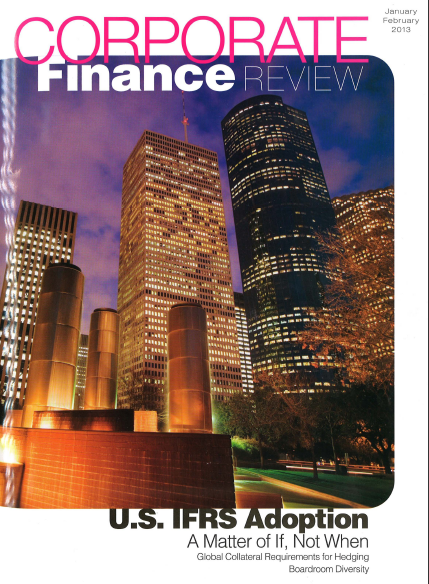 |
Gaining the Edge In The Capital Markets: Does A Corporate Sustainability Profile Help?
(January / February 2013)
Lead Paragraph: We've often heard the phrase "the market is the market," which represents the long-standing assumption of the efficient market hypothesis (EMH). This decades-old theory assumes rational behavior on the part of investors in their analyses of companies and corporate issuers in their disclosure practices, which should help to create an equity market that is efficient in terms of distribution of information, especially concerning risk factors.
|
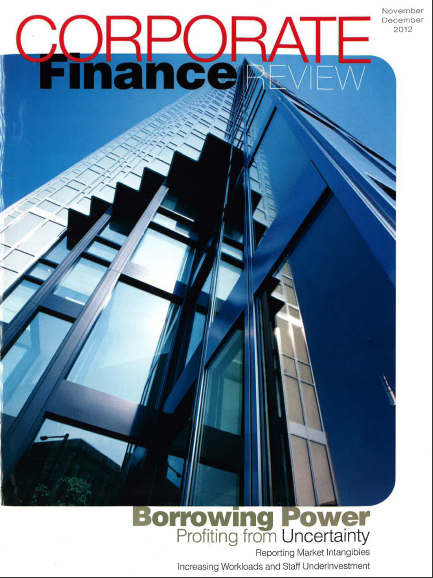 |
The Corporate ESG Beauty Contest Continues: Recent Developments in Research And Analysis
(November / December 2012)
Lead Paragraph: In these pages in recent months, we have called attention to the continued -and at times, quite dramatic -rise in the importance of corporate environmental management, or excellence or controversy in social or societal and corporate governance issues (ESG) as a comprehensive framework or systematic approach for financial analysts and asset managers to evaluate companies for port-folio decision-making. For a growing number of large asset owners, the ESG evaluation has become a proxy for the quality of board and management.
|
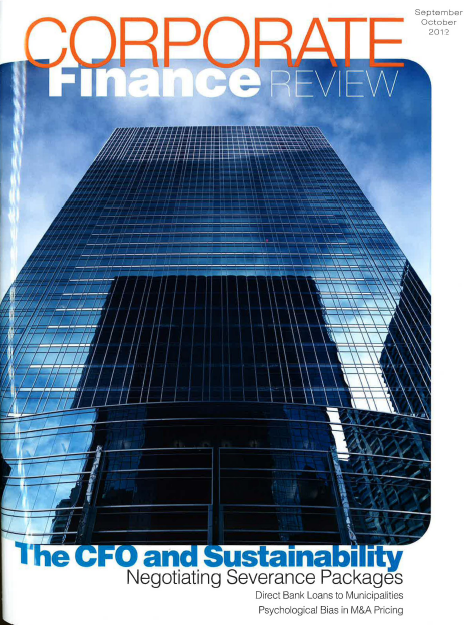 |
Trendwatching: The Coming of Integrated Reporting
(September / October 2012)
Lead Paragraph: We'll be a little bold here in predicting a dramatic change in corporate disclosure and reporting. The timing is uncertain; the mood of the investors and the forward direction of the movement is much more certain. We're talking about the rising demand for "integrated reporting" - a trend that the financial executive should keep a close eye on. The perception that such reporting is necessary and would be a good thing for both issuer and investors could hasten the reality: the arrival of a combined reporting system for publicly traded companies - that is, combining the firm's traditional financial with expanded sustainability performance reporting.
|
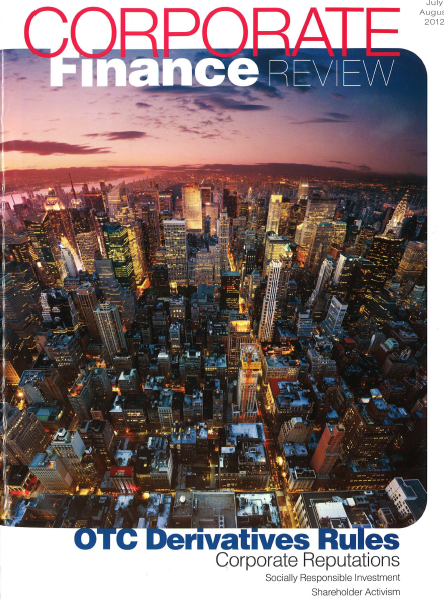 |
Tell Me a Story: What Your Company's Story Reveals -and What Shareholder Proxy Resolutions are Saying
(July / August 2012)
Lead Paragraph: Tell me a story ... Overall, the corporate story is told through strategies adopted, the unique culture formed and cultivated over time, the decisions and actions of board and C-suite, the attitudes and accomplishments of the workforce, the valuations set in capital markets, the perceptions and reputation elements that shaped all of these, and more. All of this tells the story ofthe company for the benefit of investors and a variety of stakeholders
|
 |
Corporate Beauty Contests: What is the Rank/Score for your Company ?
(May / June 2012)
Lead Paragraph: Many Americans seem to love corporate beauty contest- the constant ranking rating and scoring of perceived company corporate goverance progress,or lack thereof, and related aspects of evaluating boards and managements of publicly owned, private-sector enterprises..
|
 |
Corporate Proxies - The Traditional "Season" Has Become A Year-Round Process For Investors
(March / April 2012)
Lead Paragraph: For many board members, chief executive officers, chief financial officers, and other C-Suite executives,
the annual "proxy season" has long been characterized by intense preparation of the proxy documents for shareholder voting and busy staff preparing for the Annual Meeting. This once-a-year meeting is often the only opportunity for shareowners to voice their opinions
directly to management and the board (if members are in attendance) in the presence of other shareholders.
|
 |
Getting Ahead of Legislated Mandates: Through Voluntary Disclosure and Reporting, Corporate Managements Have Choices Today
(January / February 2012)
Lead Paragraph: Summary (or Lead Paragraph): Almost ten years have passed since the July 2002 passage by the U. S. Congress of the Sarbanes-Oxley (SOX) package of federal legislation. SOX focused public attention on corporate governance and addressed, among other things, the need for greater corporate transparency, disclosure, and structured reporting-primarily of financial indicators. Over the next two years, implementation of rules-of-the-road ensued for such things as Title III in the statutes (implemented as rules in Section 303 for
senior officer level sign -off of the financial reports). In retrospect, SOX mandates quickly became settled matters.
|
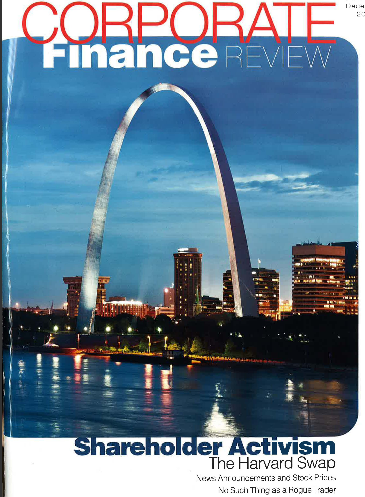 |
Paying Attention to The Dragons That May Not Be on the Accounting Map
(November / December 2011)
Lead Paragraph: Early seafaring explorers setting out to find fabled lands of riches far over the horizon were guided by maps drawn by cartographers with little knowledge of vast areas of the world's oceans that were then uncharted. Some c. 1500's maps bore the Latin lines "Hic Sunt Dracones" - here be dragons - to warn those sailors braving unknown oceans not to stray far from the familiar sea lanes charted by navigators on earlier voyages.
|
 |
Global Corporate Account Language is Expanding - Through Regulations, Mandates and Voluntary Adoptions
(September / October 2011)
Lead Paragraph: It is said that beyond the spoken word, for many humans music is a language unto itself, as are the language of mathematics, computer software, and science. Experts in those fields are as comfortable with the frameworks, nuances, idioms, and jargon of their specialties, and are as facile with their specialized language, as are financial managers with the cadence and rhythms of U.S. GAAP and the global IFRS. Financial "language" is familiar to all finance professionals, no matter what spoken language is used.
|
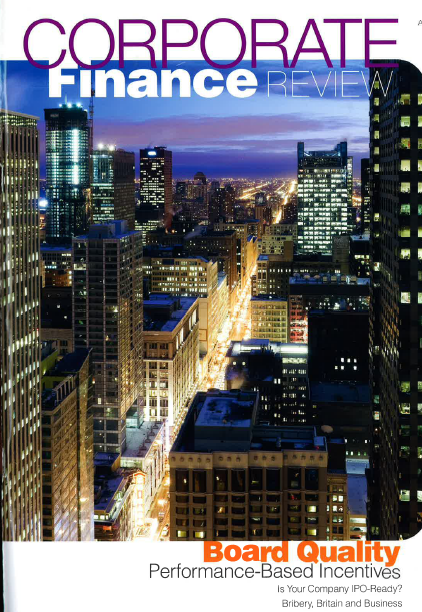 |
Teddy Roosevelt and Creation of the Modern Presidency-with Focus on Large Corporations and Corporate Behavior
(July / August 2011)
Lead Paragraph: He was born into a family of great wealth, influence,and privilege in New York City and in his adult years became a fierce protector of the poor and emerging American middle class.He was tutored privately and graduated from Harvard University (class of 1880), destined for a life of privilege. As a young public official, he visited tenement housing in the company of a social reformer(lacob Riis) who, he said, opened his eyes to the harsh living and working conditions of hundreds of thousands of immigrants recently arrived in New York from other lands.' Over a lifetime of public service he would be the champion societal reformer of the USA, battling against perceived and real injustice.
|
 |
First Degade of the 21"Century and Corporate Governance-Success or Failure-Whigh Marked the 2000-2010 Period?
(May / June 2011)
Lead Paragraph: This year will mark the 1Oth anniversary of two dramatic events that helped to define the start of the second decade of the 21't century and that had
lasting impact on business, finance, politics, and the American culture. The September 11, 2001 attacks on the World Trade Center complex in NewYork Cityin the heart of the US capital marketsbrought trading and other financial activities to a halt for almost a week at the NewYork Stock Exchange, while other firms ceased operations completely. Almost 3,000 people lost their lives in the attacks, many of whom worked in finance and banking in downtown Manhattan offices.
|
 |
Sustainability and ESG Reporting Frameworks: Issures have Gaap and IFRS for Reporting Financials What About Reporting for Intangibles and Non-Financials?
(March / April 2011)
Lead Paragraph: In the United States corporate issuers and investors have the familiar GAAP to rely on for their reporting,covering Financial aspects of the publicly owned enterprise;in Europe,the UK, and in many others nations there are international Financial Reporting Standards(IFRS).Increasingly, multinationals, or more properly large transnatioanl entrprises, may use a combination of the two accounting and financial reporitng systems. U.S. standard-setters for Generally Accepted Accounting Principles(GAAP) by congrssional action as part of Sarbanes-Oxley legislation, the Financial Accounting Standards Board(FASB), and the Securities & Exchange Comission(SEC)- are publiccly commited to ongoing deliberations on harmozation of the two systems at some point.
|
 |
SRI - Passing FAD OR An Invesment Approach on the Rise? Sustainable and Responsible investment outpaces most traditional indexes and equity returns during downturn
(January / February 2011)
Lead Paragraph: Can an investor do well financially by investing in companies that do well in their financial and extra-financial performance? The latest survey of asset owners and managers adopting ESG/Sustainable and Responsible Investment answers yes.
|
 |
Corporate proxy season: Proxies for the Debate about whose interests are served- "Owners" or Managersand Boards "In Control"
(November / December 2010)
Lead Paragraph: The Baseball Hall of Fame recognized
the career accomplishments
of the long-time New York Yankee player Lawrence "Yogi" Berra for his
on-field accomplishments 1946-63),
and later as a team coach and manager,
a broadcaster, and overall as an outstanding
member of professional baseball.
Over time Yogi has also won wide
recognition for his witty and often convoluted
quips, his aphorisms that reek of
common man wisdom. One that comes
to mind is from the 1960s as he watched
Mickey Mantle and Roger Maris hit backto-
back home runs: If's like deja vu all over again. This might apply to roday's
corporate proxy seasons as perennial
issues are raised by activist investors,
and as government (and citizens) take a
closer look at the societal dynamics
between big business and the American s o ciety- at-large.
|
 |
Sustainability and Coroporate responsibility: II. Boardsand Executive Respond to Stakehotders
(September / October 2010)
Lead Paragraph: In Part I of this article, we asked the question: How importqnt is "corporate sustainability" to investors and
støkeholders? When the question is posed
in the context of the perceived long-term
viability or sustainability of firms in
portfolio or for potential investments, the answer is "very important," as numerous
recent surveys of investors show. On
the topic of sustainability there is definite convergence of investors' thinking
with the views of today's forward-looking
corporate leaders and boards. The responses from a recent survey of leading global chiefexecutive officers revealed that when the question about sustainability
is asked, corporate leaders responded
with an overwhelming majority
view: sustainability is very important
to them and their enterprises, qnd is on
its way to beingfully embedded into their
core business.
|
 |
Sustainability Rises to top of the Straitegy - Setting for
growing number of Commerce Leaders
(July/August 2010)
Lead Paragraph: How important is corporate sustainability " to investors and stakeholders? When the question is posed to them in the context of the projected long-term viability or sustainability of the firms that they do own or might invest in, the
answer is "very important." On the topic of sustainability, there is definite convergence
with the views of today's forward-
looking corporate leaders. The
responses from a recent survey of leading
global chief executive officers showed that when the question about sustainability is asked of them, an overwhelmirg maj ority of corp orate leaders
responded that sustainability was very important to them and their enterprises, and was on its way to being fully embedded into their core business.
|

|
Will Public Outrage Drive Regulatory Reform?
(March/April 2010)
Lead Paragraph:
Capitalism is all about evaluating and balancing risk and opportunity to seek maximum return on investment. The process is straightforward,
or should be: The issuer's shareholder select members of company boards to oversee management-and Presumably oversee strategies and risk-taking and
to represent their interests as the board carries out its duties. Boards appoint the "chiefs" (chief executive officer,chief financial officer, et al.) to
manage but not micromanage the enterprise day-to-day, and to be ready to step in to protect the owners. Things don't always work out quite that way.
|

|
Where Do We Go From Here? As The Financial Crisis Appears To Ebb, What Will Emerge?
(January/February 2010)
Lead Paragraph:
As the year 2010 begins, discussions in Washington DC are centered on "reforms"-of the capital markets, cormercial banking, financial services, as
well as for healthcare and medicine, and additional layers of protection for consumers and investors. How much regulation is "enough" to prevent a repeat of
the financial markets crisis of 2007-2009? The number of pages of regulations covering activities in banking and brokerage activities is in the thousands.
And these were not enough to prevent the market crisis that began with the freezing of auction rate securities in February 2007.
|

|
The National Investor Relations Institute at 40 Years: Many Changes And Many More To Come
(November/December 2009)
Lead Paragraph:
The term investor relations first came into being in corporate management circles in the early 1960s. Before that, the term for the person
(usually a male) who dealt with retail investors and financial editors was generally financial communicator. The equity and bond investor in the US in the
post-World War Two period was typically an individual-the retail customer. There were some "institutional customers"- a mutual fund manager, a trust officer
of a bank that had some blue chip equity issues in portfolios (and more likely corporate bonds), or a family trust.
|

|
The Spectacle Of The Market Collapse Inquiries
(September/October 2009)
Lead Paragraph:
In ancieut Rome.once the western world's Undisputed Capital goverment,commerce,culture and entertainment, there was often an uneasy truce
between the rulers and the empire's population. To divert the populace's attention, the emperors woulcl frequently present spectacles- burly battle-hardenecl
gladiators pitted against each other or perhaps even ferocious animals; there would parades of captives and treasures carried to Rome from far-off lands; and
then there was always the "circus" (named for a giant circular amphitheater built between the hills of Rome) where spectacular performances of all kinds
titillated the senses of the Roman people.
|

|
A Period Of Interlude As Reformers Consider The Proper Form Of Market Regulation
(July/August 2009)
Lead Paragraph:
The primary currcncy of the capital markets is . . . trust. When trust is broken between corporate issuer and investor, or investor and asset
manager, things can go terribly wrong. That's the summation of thc capital market woes of the past year, and the prolonged sitting on the sidelines in summer
2009, as many institutions have "parked their money" for now. Âd when trust is broken, calls for "reform" are heard from far and wide.
|
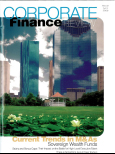 |
Sovereign Wealth Funds - Capital Market Players From Variety of Backgrounds
(March/April 2009)
Lead Paragraph:As corporate and
public-sector issuers seek out suitable investors for their debt and equity
needs amidst the bear market and credit crunch, a distinct class of
institutional investors has been coming into view: the sovereign
wealth funds (SWFs). State-owned and sponsored institutions, numbering
sixty or more and based in many nations, SWFs are putting some of their
revenues to work in a variety of ways reflecting each country's preference
or tolerance for risk, in addition to each country's culture and economic
systems (including those of many socialist-leaning countries.)
|
 |
Global Capital Markets and Corporate Compliance Reforms Ahead: The G-20 Tackle The Issues
(January/February 2009)
Lead Paragraph:For at least seven decades - since the dramatic collapse of the American stock market in 1929 and the adoption
of financial markets oversight in the following years of the Great Depression - laws and rules addressing market reforms and the protection of investors have been mainly national
pursuits. In the last three decades, as part of the globalization of everything, collaborative rule making has been on the rise. For example, the Basel Accord reached in the 1980s
for oversight of commercial banking.
|
 |
The Capital Markets Crash of 2008: What Kind of Regulatory Reforms Are Needed?
(November/December 2008)
Lead Paragraph:The kind of corporate governance failures that we are seeing in the collapse
of leading investment banks, commercial banks, and other financial services powerhouses was not supposed to happen any more. Where were
the boards of directors when Countrywide, Lehman Brothers, Bear Stearns, Washington Mutual and others were driven over the
cliff by their managers? An oh-so-logical question we could ask: What were the top executives of these firms thinking?
|
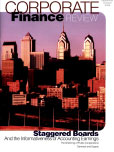 |
The Greening of Public Corporations
(September/October 2008)
Lead Paragraph:Greening is everywhere in the corporate world, and seemingly epidemic among corporate
managers at all levels. Board members are looking for ways that their enterprise can be more green. Is this a passing fad (remember the
corporate embrace of "Zero Defects," "zero-sum-budgeting," and others): Or is the greening of the corporation a longer-lasting trend?
|
 |
Environmental, Social, and Governance Concerns Converging on The Corporate World
(July/August 2008)
Lead Paragraph:The growing consensus among financial analysts and investment
portfolio decision makers appears to be that share-price valuation and comprehensive financial analysis
have been profoundly changing over this first decade of the twenty-first century. The reliance "only" on financial
metrics and quantifiable corporate performance is diminishing, and now as much as one-third or even 40% of investment
decision making is based on key investor perceptions, as the focus on the traditional metrics (financials and
issuer financial performance) slides to a 60% factor.
|
 |
Shape Shifting: Dramatic Changes in The Capital Markets
(May/June 2008)
Lead Paragraph:In popular folklore and mythology in almost
every culture we find tales of mysterious creatures capable of changing physical form or
shape - "shape shifters," the ancients dubbed them. Such legends live on today. Shape
shifters are capable of making major alterations to their general appearance. Sometimes it
seems as though shape-shifting is becoming a dominant theme in today's capital market
trends - with some of these metamorphoses, it's hard to know if we are looking at something
real and substantive or something metaphorical or hypothetical. It could just be a theory
floated about, the beginning of a trend, or the end of an era.
|
 |
Key Issues to Watch in Proxy Season 2008
(March/April 2008)
Lead Paragraph:It's become an annual event that institutional investment managers, their consultants/advisors, and financial
analysts eagerly look forward to: The RiskMetrics Group's annual proxy season review and preview: a review of the critical issues and events of 2007 and a look
at what is on the table for proxy season 2008. The conference was entitled "2008 RiskMetrics Group US Governance Conference" and was held in New York City.
What was set out for investors in the conference is of critical importance to financial executives.
|
 |
2008: Another Year of Tremors and Seismic Shifts for Finance Professionals?
(January/February 2008)
Lead Paragraph:Those who live in earthquake fault zones, such as the Pacific Rim, know all
about earthquakes and the sudden shaking of buildings and highways. The frightening shifts of the earth's crust occur as
tremendous pressure is released by the grinding of massive textonic plates far beneath the ground. Unseen, these events often occur
without advance warning; at other times, warning signs will be there, and you ignore them at your peril. Earthquakes can create wide
swaths of damage on land; if they occur in the seabed, deadly tsunamis may strike distant shorelines.
|
 |
In a Blink: Research Is Confirming Key Trends in Finance, Corporate Reporting, and Capital Markets
(November/December 2007)
Lead Paragraph:You were certain you knew a particular thing, but the thought needed
confirmation. However, there was no time for fact-finding or research. Acting on a hunch you mad a necessarily quick decision. Was your
hunch right? Most often the answer is yes, our hunch was correct and the right course was take. The best-selling author
Malcom Gladwell captured the power of human hunches and intuition in his book, Blink: The Power of Thinking Without Thinking.
|
 |
Your Company's ESG - Environmental, Social, and Governance Factors Are Mattering More Now to Institutional Investors
(September/October 2007)
Lead Paragraph:The financial executive's daily conversations are studded with abbreviations and acronyms - CEO, CFO, ROI,
SEC, FASB, PCAOB, LBO, CDO, ROE, and many more. Add this to your collection: ESG. Chances are an increasing number of the investors and financial analysts
on the buy-side who analyze your firm are considering or actually measuring your organization's ESG along with other factors in their buy-sell-hold
decision making.
|
 |
Proxy Seasons: Observation Posts for Institutional Investor Concerns
(July/August 2007)
Lead Paragraph:Proxy seasons have become excellent observation posts for examining institutional shareholder concerns. In proxy
matter, there are now more players and more power exerted (and exhibited) by a growing corps of shareholder-activists; more exposure of individual players (especially
CEOs and directors) in public-opinion crosshairs; more media coverage of proxy campaigns, including votes for the previously invisible board-of director candidates; and more
involvement of high-profile public-policy figures in campaigns (such as New York City Comptroller William Thompson, California State Treasurer Bill Lockyer, Connecticut State
Treasurer Denise Nappier, and others).
|
 |
The Anti-Sarbanes-Oxley Movement: Have Corporate-Governance Reforms Gone Too Far?
(May/June 2007)
Lead Paragraph:The critical question in Spring 2007 is, How long is long enough? The answer will depend on your point of view and vested
interest when the subject is the regulation of securities and US capital markets. Is five years long enough for this cycle of reforms to run its course?
Should we begin to weaken, repeal, or perhaps ignore the reforms of the first seven years of the twenty-first century?
|
 |
The Way Forward: The Global Auditing Big Six and Their Vision of Financial Reporting
(March/April 2007)
Lead Paragraph:First it was the Big Eight US (and increasingly global) accounting and auditing giants.
Then there were the mergers that produced the Big Five followed by the spectacular collpase of the Arthur Andersen partnership. Suddenly
it was down to the Big Four: KPMG International, PriceWaterhouseCoopers, Ernst & Young, and Deloitte Touche Tohmatsu. But if we add in BDO
International and Grant Thornton for a new agglomeration of interests, we have a global "Big Six."
|
 |
Globalization Creates a New Era: Economies, Regulations, Technologies, Cultures, and Financial Markets Come Together
(January/February 2007)
Lead Paragraph:In his popular books on the theme of global trade - The World is Flat:
A Brief History of the Twenty-first Century and, before that, The Lexus and the Olive Tree-New York Time Foreign Affairs Columnist
Thomas Friedman brilliantly describes and elegantly frames the boundaries and frontiers of the new era that corporations and capital
market players entered in 1989.
|
 |
Time Travelers: Boards Backdating Stock Options
(November/December 2006)
Lead Paragraph:Time Travel - we're all fascinated with the fantasy of being able to travel back and forth in time.
Imagine whisking back in time to correct mistakes or fast-forwarding to watch the events of your life in 2026. In the 1985 movie Back to the Future,
slacker teen Marty McFly is transported back to 1955 in a dilapidated DeLorean time machine created by mad scientist Doc Brown. Of course, this is all fiction.
Or is it?
|
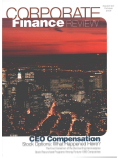 |
Dramatic Events May Follow Expanded Proxy Disclosure Ordered by The SEC for CEO's "Total" Compensation Packages
(September/October 2006)
Lead Paragraph:Executive compensation has become the major lighting-rod issue in the changing relationships among
institutional shareholders, corporate boards, and senior executives. CEO pay emerged as a more public and social issue in the mid-1980s to the early 1990s.
It faded a bit in the heady days of the 1995-2000 bull market but then came roaring back into the headlines in the aftermath of dramatic corporate scandals,
congressional inquiries, Securities and Exchange Commission (SEC) penalties, an epidemic of financial restatements, and continued inquiry by observers and journalists.
|
 |
Tackling Short-Termism: Mighty Tasks Ahead For Investors, Corporations, and Financial Analysts
(July/August 2006)
Lead Paragraph:As the hoary expression goes, "Everyone talks about the weather, but no one does
anything about it." As if we mere mortals could affect gigantic weather patterns! Similar things are often said about the prevelant
short-term views of investors, corporate executives, and financial analysts. While we all can agree that a focus on the next quarter's
performance vs. the long-term sustainability of the enterprise is not good for any of the market players, who is going to do anything
about it?
|
 |
America's Federal Reserve Banks: Much More Influence on Your Professional and Personal Life Than You Might Imagine
(May/June 2006)
Lead Paragraph:Pop Quiz: What is the Federal Reserve System? Oh yes, it is the organization
that sets key bank interest rates, "controls" inflation, and has something to do with regulation of the United States
banking industry... right? In March 2006, at one of his public press conferences, President George W. Bush suffered a
senior moment (that all of us have experience one time or another) when he failed to recall the name of "the Fed" in
answering a question from the audience, saying only that it wasn't his Administration but an "independent organization" that
sets interest rates that in turn decide outcomes on home mortgage rates. (He couldn't recall the name of the Federal Reserve
Bank for a brief moment.)
|
 |
Shareholder Involvement In Corporate Affairs
(March/April 2006)
Lead Paragraph:Shareholder involvement in the affairs of the corporations held in
their portfolios - whether as institutional, fiduciary, or individual investor - has clearly and definably been
accelerating since the recent spare of corporate scandals began to seriously erode the trust existing among shareowner,
senior management, and corporate boards. Shareholder advocacy for change has long been with us; the recent dramatic increase
in investor activities reflects a serious erosion of trust and more widespread support for shareholder activism.
|
 |
A Momentous First Decade of the 21st Century - Financial Executives Look Ahead at the Midpoint
(January/February 2006)
Lead Paragraph:For those who keep track of such things, we are just past the midway point in the eventful first
decade of the 21st century. And quite a tumultous decade this "1/21" has been for corporate financial managers!
We can begin a look back to the end years of the 20th century with a recalling of "C" suite angst as the dreaded Y2K
deadline neared.
|
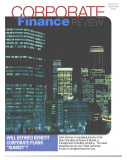 |
Will Defined Benefit Corporate Plans "Sunset"?
(November/December 2005)
Lead Paragraph:The natural process of the aging of the American population, as millions of men and women
trek inexorably toward their senior years -- an toward some type of retirement or curtailment of work schedule --
is raising serious questions about the safety, stability, and future of long-term reitrement "safety-net" systems.
In the spotlight: defined benefit corporate pension plans, which have long been the staple of major U.S. corporations'
employee benefits, especially for manufacturing companies. And Social Security for almost all US retirees.
|
 |
Are Corporate Accounting Systems Out-of-Date?
(September/October 2005)
Lead Paragraph:We can all agree that today's business environment is complex,
especially thanks to technological advances, and that traditional ways of doing business are, in fact, becoming
quite short-term in many instances. Today's hard goods manufacturer may well be tommorow's leading services
provider in one sector or another. (The disappearance of the ATT Bell system's long-term manufacturing dominance
is one example in telecommunications.) As industry changes, intriguing quiestions arise:
|
 |
What The NYSE-Archipelago Merger May Mean To Corporate Finance Managers
(July/August 2005)
Lead Paragraph:The surprise announcement in April 2005 that the venerable New York Stock Exchange
(NYSE) would be combining resources with the upstart electronic exchange, Archipelago, signaled how dramatically the financial
markets have been changing. In the discussion about the future of the NYSE that ensued, the importance of the stock exchange
mechanism to the well-being of the capitalist system was the focus of mych media coverage.
|
 |
Independent Finincial Research: Changing The Way Investors View Research?
(May/June 2005)
Lead Paragraph:What if you gave a party and no one showed up? This is not a
trick question; the "party" could well take the form of the global settlement reached by ten blue chip names - the
major Wall Street investment firms - and New York Attorney General Eliot Spitzer, requiring that "independent" financial
research be made available to retail customers for five years. What if few or no investors follow the guidance of the
outside research, request such research, or even care that it is available?
|
 |
Popular Movements: A Challenge for Institutions and Managers
(March/April 2005)
Lead Paragraph:Remember the "environmental movement?" And, before that, the "conservation
movement" of the early twentieth century? These popular societal movements are still with us, of course, but momentum is
rapidly building in support of the emerging global "sustainability movement," with more intense focus on public corporations.
And a corolary movement is gaining strength in the U.S., especially at the community level, focused on "environmental justice,"
especially where corporations have operations or influence investment in poor or minority communities.
|
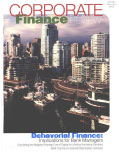 |
2005: The Era of Corporate Reformation Continues
(January/February 2005)
Lead Paragraph:As we turned the pages of the calendar, for the most public companies
December 31 marked the close of official business; year-end financial results will soon be disclosed. The corporation's
most important report card will then be presented to investors and potential owners (with thousands of companies reporting in
a narrow time frame). Employees will also be able to clearly understand the state of the business - especially if they read
the CEO's Management Discussion and Analysis (MD&A) and other key materials in the Annual Report and 10-K filings. On the other hand,
the meandering course of a trend is more difficult to follow, particularly in an era characterized by dramatic events that do not
begin or end in a neatly calendarized fashion.
|
 |
Pension Fund "Socialism" and the American Economy
(November/December 2004 - Volume 8 - Number 8)
Lead Paragraph:In recent years, "corporate governance" has become our shorthand for a variety of developments:
investor focus on board composition and performance; report cards on executive performance (and behaviors); an umbrella term for demands for improved
corporate "citizenship," especially as presented by social and economic justice activists; a description of the package of federal statutes and the
reams of new regulations flowing from 2002 congressional decisions and related regulatory implementation (for example, the Sarbanes-Oxlet Act and SEC
rules); the high-profile prosecutions of analysts, investment bankers, and mutual fund advisors by state attorneys general; and dramatically increased
institutional investor activism, especially on the part of the nation's employee pension funds.
|
 |
The Sarbanes-Oxley "Revolution": Two Years and Counting
(September/October 2004 - Volume 8 - Number 7)
Lead Paragraph:It is more than two years now since the U.S. Congress voted to approve - and then rushed
to the White House - the final version of the Sarbanes-Oxley package of legislation (SOX). President George W. Bush quickly put his signature
to the bill, making it "instant" federal law. (Some provisions took effect upon signing.) Compared to other recent legislative initiatives,
SOX was a simply stated document, unlike tax reform measures or the complex Medicaid "reform" legislative packages also passed by committees or
full chambers of Congress.
|
 |
Forces Shaping the Financial Professional's World
(July/August 2004 - Volume 8 - Number 6)
Lead Paragraph:Corporate and capital markets finance professionals correctly
sense that their professional lives are often buffeted and their practices shaped by larger, outside forces.
Financial executives quickly feel the effects of social trends and public policy-making emanating from the intersection
of politics, government, media coverage, and institutional investor activism. These forces are the most impactful outside
"issue shapers and movers," and their influence on financial reporting and accounting practices today is considerable.
|
 |
2004 Proxy Season - A Test of New Rules and Attitudes
(March/April 2004 - Volume 8 - Number 5)
Lead Paragraph:Attention, board chairs, independent directors, chief executive officers,
chief financial officers, and other senior corporate managers: with the turning of the
calendar pages in January, you have now "crossed over" into a new and potentially far more
volatile and uncertain operation issues arena for publicly owned corporations. The 2004
proxy voting season and the usual (mandatory) annual shareholder meetings are likely to
be much more contentious for some companies and will provide a peek at the uncertain
future for many other issuers.
|
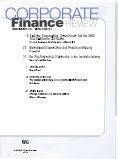 |
The Changed Environment - Challenges and Opportunities in 2004
(January/February 2004 - Volume 8 - Number 4)
Lead Paragraph:The snowball is rolling down the hill,
gathering speed now, growing larger in size, finally noticeable from a distance, a thing
of major proportions and momentum, and seen in its entirety as a potential threat to those
in its path. The snowball may be an apt metaphor for the aggregated chain of events that in
2004 will create challenges for corporate financial executives, chief executive officers, and
members of boards of directors. Experts are projecting important and far-reaching changes in
corporate financial reporting, accounting, disclosure, and financial engineering that will also
have direct effects in the capital markets. The combined effect throughout the year might be
compared in one's imagination to that metaphoric snowball barreling down the steep mountianside
toward the villagers below. But at least the alarms have been clearly sounding for finance
executives!
|
 |
The Current Era of Change
(November/December 2003 - Volume 8 - Number 3)
Lead Paragraph:Demands on corporate executives, members of boards
, regulators, and financial markets for reform and greater accountabi
lity continue to grow in the wake of legislative, regulatory, and in
vestor actions. Significant changes are occuring in audit practice,
corporate disclosure, financial reporting, financial analysis and re
search, and individual and institutional accountabilities. This col
umn examines the ongoing revolution in corporate governance as the s
econd anniversary of the spectacular Enron collapse approaches. It
was reported in 1781 that when the siege of Yorktown was lifted and
the British troops surrendered to the American Revolutionary forces,
they were marched out to their awaiting ships with regimental colors
cased, while the tune the pipers and drummers played was an old
British march with the appropriate title, "The World Turned Upside
Down." For the expanding British Empire, this was, at the moment,
a true statement!
|
 |
Executive Compensation for Senior Managers
(September/October 2003 - Volume 8 - Number 2)
Lead Paragraph:In ancient Greece, the philosopher Aristotle is said to have urged that no
citizen of the first western democracy be paid more then seven times the wages of the lowest
paid citizen. Twenty three centuries later, the founders of Ben & Jerry's, the ice cream
manufacturing firm "with a social conscience," took this suggestion seriously and established
the 7-to-1 ratio within their young firm. Senior executives' pay levels were not to exceed
seven times that of their lowest wage level employees. Social responsibility advocates and
some journalists cheered: few companies actually followed the example. (In 2000, the founders,
Ben Cohen and Jerry Greenfield, sold their company to Unilever for $326 million and Mr. Cohen
received $39 million for his interests.)
|
 |
The Future of Securities Analysis
(July/August 2003 - Volume 8 - Number 1)
Lead Paragraph:The global settlement reached with major Wall Street investment
banking and brokerages by the Securities and Exchange Commission (SEC) and the New York
Attorney General in April 2003 had the objectives of settling the issue of separating the
research function from investment banking and trading, and reassuring investors they could
rely on the "independent" research to be offered in the future by the ten firms involved in
the settlement. Some observers noted that the settlement closed the boom era of the 1990s
and cleared the way for a new era in research. For the first time, the details of the
settlement touched off a lively debate over the future of "paid" and "free" financial
research and the expected effects of the agreed-to changes on the corporate community,
as well as on professional analysts.
|
 |
Proxy Season 2003 - A Window Into the Future
(May June 2003 - Volume 7 - Number 6)
Lead Paragraph:Most U.S. public companies schedule
shareholder proxy voting and annual meetings in the first half of the year (following
the close of business on a calendar basis, December 31). In recent years, there has
been a steady increase in the numbers of resolutions introduced by individual and
institutional shareholders, comprising two primary types: demands for changes in the
way the corporation is structured or governed (corporate governance), and pressures
applied through the proxy to change corporate behavior (e.g., to have the target company
exhibit social responsibility).
|
 |
Sarbanes-Oxley Law Creating a Challenging Operating Environment for Corporate Finance Professionals
(March/April 2003 - Volume 7 - Number 5)
Lead Paragraph:The somber mood of federal policymakers was
summed up by Senator Paul Sarbanes of Maryland, who told his colleagues: "For nearly seventy
years, our framework of [U.S.] securities laws proved remarkably effective at protecting
investors. Recent events [in 2002] show how urgently this framework needs reform. We must
ensure that investors can once again trust corporate executives and their financial reports,
and have confidence in the independence of accountants and analysts. We must assure that the
SEC has adequate funds to carry out its mandate." Responding to the bold challenge of the
Chair of the Senate Banking Committee, the U.S. Senate and House of Representatives eventually
passed the wide-ranging Public Company Reform and Investor Protection Act of 2002, and President
Bush quickly put his signature on the package of new laws on July 31, 2002.
|
 |
Corporate Governance in 2003: Forces Converge to Further Reforms
(January/February 2003 - Volume 7 - Number 4)
Lead Paragraph:The year 2002 will be viewed in retrospect as a
period of intense examination of corporate behavior and financial performance, and the particular
time when public sentiment shifted strongly in favor of significant reforms to address the
governance issues of publicly owned companies. Two clear examples of this new public mood were
the passage of the Sarbanes-Oxley Act by Congress, and the adoption of stringent governance rules
for listed companies by the New York Stock Exchange. Just one year ago, Enron, the former number
seven company in the Fortune 500 rankings was in financial free fall; much has happened since,
with public and private sectors, self-regulatory organizations (SROs), and non-governmental
organizations (NGOs) announcing one initiative after another to address corporate governance
reform.
|
 |
The Period of Reformation Has Begun for the Financial Markets
(November/December 2002 - Volume 7 - Number 3)
Lead Paragraph:Wall Street interests and the American corporate
sector are carefully watching the mood of the American investor, The level of confidence and
trust by investors in financial reporting, and in the equities market overall, is quite low.
Factors leading to this depressing state-of-mind and negative public mood include the dramatic
collapse of the technology stock boom in spring 2000; the steady decline of major stock indices
since that time; the effects of the broad economic contraction that began in spring 2001
(ending 120 months of expansion); the terrorist attacks centered in New York City and
Washington D.C. in September 2001; and the expanding flow of bad news about corporations in
2002, especially after the year-end Enron financial collapse.
|
 |
Government Intervention Versus Self-Regulation for the Financial Markets
(September/October 2002 - Volume 7 - Number 2)
Lead Paragraph:Wall Street interests and the American corporate
sector are carefully watching the mood of the American investor, The level of confidence and
trust by investors in financial reporting, and in the equities market overall, is quite low.
Factors leading to this depressing state-of-mind and negative public mood include the dramatic
collapse of the technology stock boom in spring 2000; the steady decline of major stock indices
since that time; the effects of the broad economic contraction that began in spring 2001
(ending 120 months of expansion); the terrorist attacks centered in New York City and
Washington D.C. in September 2001; and the expanding flow of bad news about corporations in
2002, especially after the year-end Enron financial collapse.
|
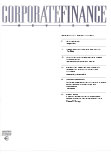 |
Calls for Governance Reform Increase as Public Sector Focuses on Accountants and Corporations
(July/August 2002 - Volume 7 - Number 1)
Lead Paragraph:Domestic and multinational corporations and
their accounting and auditing firms continued to be buffeted by macro forces in the wake of
the two major series of events that affected the United States in 2002. The first set of events
began with the terrorist attacks of September 11, followed by the anthrax mailings in the weeks
that followed the crash of the four airliners. The issues surrounding homeland security quickly
became very visible matters for debate by governmnent officials, journalists and commentators,
think tank scholars, academics, and analysts, many recommending dramtic increases in domestic
security that will intimately involve the private sector.
|
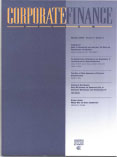 |
Have We Entered the Enron-Gate Era of Corporate Governance and Accountability?
(May/June 2002 - Volume 6 - Number 6)
Lead Paragraph:Corporate finance officers could find themselves
operation in a significantly changed environment in the months and years after the spectacular
financial failure of Enron. The media coverage of the various Enron post-mortems and focused
broad public attention on the issues of corporate governance and corporate accountability.
Until now, corporate governance was primarily a business and finance term with limited use,
usually referring to issues concerning the internal organization and management of a public
corporation. It mattered most to shareowners. Coming into vogue over the past 15 years as
the demand for greater rights for shareowners increased, corporate governance advocates tended
to focus on the protection, expansion, and exertion of these stockholder rights.
|
|

|







